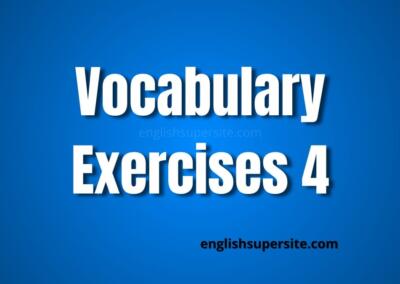
Future Perfect
Sometimes called Perfect Future, the Future Perfect is a Verb Tense associated with the Future Tense in English.
We use Future Perfect when you want to speak about an event that will be completed before a particular time in the future. The Future Perfect tense indicates that an action is in the future relative to the speaker.
Quick Example (will)
- By next December, you will have studied here for 4 years.
- By next December, you won’t have studied here for 4 years.
- By next December, will you have studied here for 4 years?
Quick Example (going to)
- By next December, you are going to have studied here for 4 years.
- By next December, you are not going to have studied here for 4 years.
- By next December, are you going to have studied here for 4 years?
Form (will)
| I – you – he – she – it – we – you – they |
|---|
| Regular Verbs: will have + verb (past participle)* Irregular Verbs: will have + verb (past participle)** |
*Pronouncing “ed” at the end of words
**List of Irregular Verbs
Form (going to)
| I | he – she – it | you – we – you – they |
|---|---|---|
| Regular Verbs: am + going to + verb (past participle)* Irregular Verbs: am + going to + verb (past participle)** | Regular Verbs: is + going to + verb (past participle)* Irregular Verbs: is + going to + verb (past participle)** | Regular Verbs: are + going to + verb (past participle)* Irregular Verbs: are + going to + verb (past participle)** |
*Pronouncing “ed” at the end of words
**List of Irregular Verbs
Common Signal Words*
- By…
- By the time…
- Tomorrow
- By then…
- The day after tomorrow
- Next week
- Next month
- in two years
- in 2035
- Probably
*ATTENTION: These signal words are just an indication that the future form can be used.
Use
- An event that will be completed before a particular time in the future
- An action that will be completed before another event takes place
1. An event that will be completed before a particular time in the future
- By the time she gets home, her maid is going to have cleaned the entire house.
- He will have received my promotion by March next year.
- They are going to have finished this test by 5 o’clock.
2. An action that will be completed before another event takes place
- She will have been in Rome for six months by the time she leaves.
- This Friday, they are going to have had my car for a week.
Study Also:
Examples
Future Perfect using Work (Regular Verb) – will
| Affirmative | Negative | Interrogative |
|---|---|---|
| I will have worked. | I will not have worked. | Will I have worked? |
| You will have worked. | You will not have worked. | Will you have worked? |
| He will have worked. | He will not have worked. | Will he have worked? |
| She will have worked. | She will not have worked. | Will she have worked? |
| It will have worked. | It will not have worked. | Will it have worked? |
| You will have worked. | You will not have worked. | Will you have worked? |
| We will have worked. | We will not have worked. | Will we have worked? |
| They will have worked. | They will not have worked. | Will they have worked? |
Future Perfect using Work (Regular Verb) – going to
| Affirmative | Negative | Interrogative |
|---|---|---|
| I am going to have worked. | I am not going to have worked. | Am I going to have worked? |
| You are going to have worked. | You are not going to have worked. | Are you going to have worked? |
| He is going to have worked. | He is not going to have worked. | Is he going to have worked? |
| She is going to have worked. | She is not going to have worked. | Is she going to have worked? |
| It is going to have worked. | It is not going to have worked. | Is it going to have worked? |
| You are going to have worked. | You are not going to have worked. | Are you going to have worked? |
| We are going to have worked. | We are not going to have worked. | Are we going to have worked? |
| They are going to have worked. | They are going to have worked. | Are they going to have worked? |
Future Perfect using Go (Irregular Verb) – will
| Affirmative | Negative | Interrogative |
|---|---|---|
| I will have gone. | I will not have gone. | Will I have gone? |
| You will have gone. | You will not have gone. | Will you have gone? |
| He will have gone. | He will not have gone. | Will he have gone? |
| She will have gone. | She will not have gone. | Will she have gone? |
| It will have gone. | It will not have gone. | Will it have gone? |
| You will have gone. | You will not have gone. | Will you have gone? |
| We will have gone. | We will not have gone. | Will we have gone? |
| They will have gone. | They will not have gone. | Will they have gone? |
Future Perfect using Go (Irregular Verb) – going to
| Affirmative | Negative | Interrogative |
|---|---|---|
| I am going to have gone. | I am not going to have gone. | Am I going to have gone? |
| You are going to have gone. | You are not going to have gone. | Are you going to have gone? |
| He is going to have gone. | He is not going to have gone. | Is he going to have gone? |
| She is going to have gone. | She is not going to have gone. | Is she going to have gone? |
| It is going to have gone. | It is not going to have gone. | Is it going to have gone? |
| You are going to have gone. | You are not going to have gone. | Are you going to have gone? |
| We are going to have gone. | We are not going to have gone. | Are we going to have gone? |
| They are going to have gone. | They are going to have gone. | Are they going to have gone? |
Future Perfect using Study (Regular Verb) – will
| Affirmative | Negative | Interrogative |
|---|---|---|
| I will have studied. | I will not have studied. | Will I have studied? |
| You will have studied. | You will not have studied. | Will you have studied? |
| He will have studied. | He will not have studied. | Will he have studied? |
| She will have studied. | She will not have studied. | Will she have studied? |
| It will have studied. | It will not have studied. | Will it have studied? |
| You will have studied. | You will not have studied. | Will you have studied? |
| We will have studied. | We will not have studied. | Will we have studied? |
| They will have studied. | They will not have studied. | Will they have studied? |
Future Perfect using Study (Regular Verb) – going to
| Affirmative | Negative | Interrogative |
|---|---|---|
| I am going to have studied. | I am not going to have studied. | Am I going to have studied? |
| You are going to have studied. | You are not going to have studied. | Are you going to have studied? |
| He is going to have studied. | He is not going to have studied. | Is he going to have studied? |
| She is going to have studied. | She is not going to have studied. | Is she going to have studied? |
| It is going to have studied. | It is not going to have studied. | Is it going to have studied? |
| You are going to have studied. | You are not going to have studied. | Are you going to have studied? |
| We are going to have studied. | We are not going to have studied. | Are we going to have studied? |
| They are going to have studied. | They are going to have studied. | Are they going to have studied? |
Study Also:
Abbreviations Cohesion and Coherence Collocations Comparative Conditionals Frequent Errors Future Continuous Future Perfect Future Perfect Continuous Future Simple Homonyms Interjections Journaling Learn English Linking Words Logical Flow Past Continuous Past Perfect Past Perfect Continuous Past Simple Plural Present Continuous Present Perfect Present Perfect Continuous Present Simple Pronunciation Question Tags Quiz Quotes Simple Future Simple Past Simple Present Spelling Superlative Transition Words
Share with your friends!






